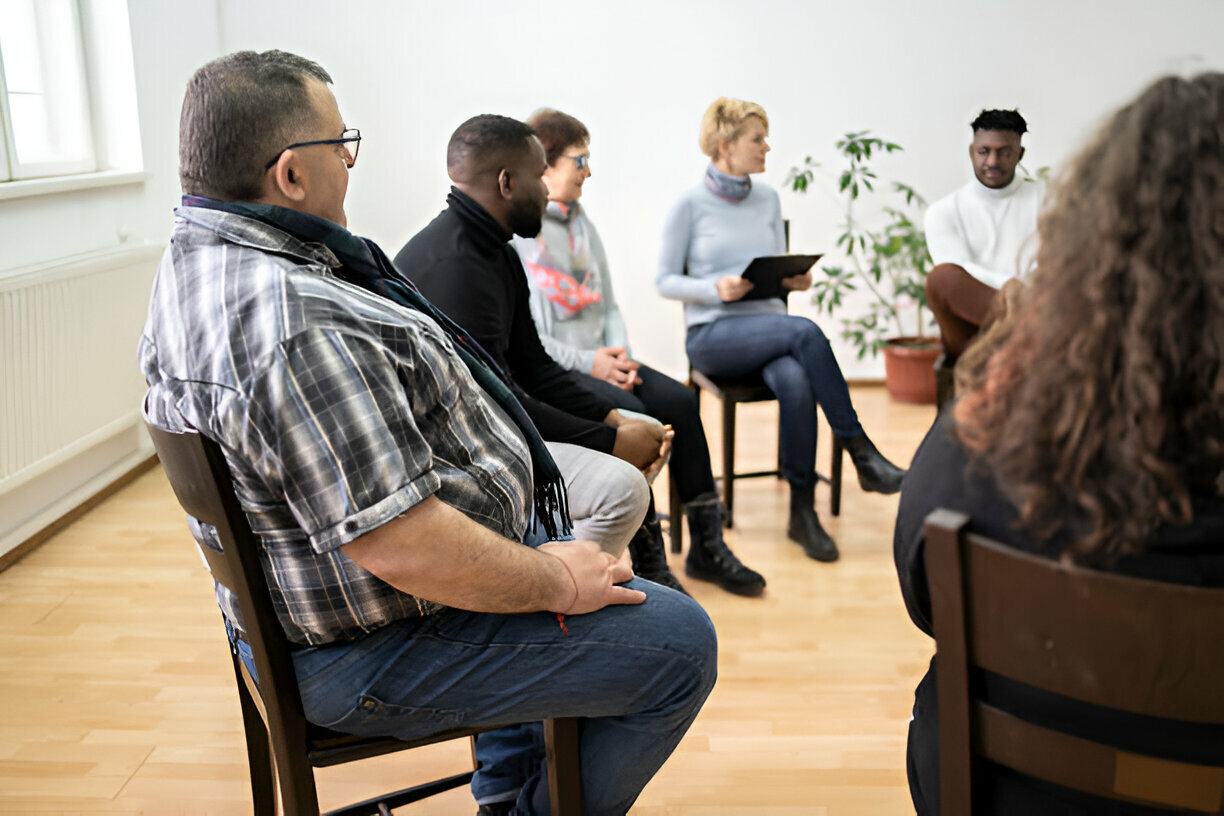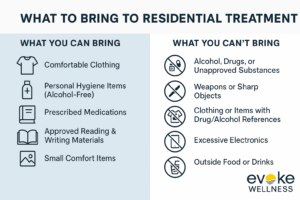When you’re newly diagnosed, stepping into a residential treatment program can feel like walking into a whole new world with its own rules, rhythms, and language. Your mind might be spinning with bigger questions—Will this work? Will I fit in? Will I feel safe?—but a very practical question comes up fast:
What should I bring?
It’s not just about clothes or toiletries. It’s about what will help you feel grounded during one of the biggest transitions of your life. Knowing what’s welcome and what’s not can take away some uncertainty and help you feel more prepared, so you can focus on what really matters: your recovery.
Here’s a clear, human, no-shame guide to packing for your residential treatment program—what to bring, what to leave behind, and why these rules exist.
What You CAN Bring: Comfort and Essentials That Support Healing
1. Comfortable Clothing
Think simple, breathable, and easy to move in. You’ll have therapy sessions, wellness activities, and downtime—so prioritize comfort over style.
- Bring layers—Massachusetts coastal weather can swing from cool mornings to warm afternoons.
- Avoid extremes—no overly revealing or offensive graphics, out of respect for the group setting.
One former client said they brought their favorite hoodie, “because when you’re sitting in group talking about the hardest things you’ve ever been through, having something familiar to wrap around you matters.”
2. Personal Hygiene Items (Alcohol-Free)
You’ll want your own toiletries, but they must be alcohol-free—even small amounts in mouthwash, hairspray, or skincare products are a no-go.
- Double-check ingredient lists before packing.
- Choose travel-size bottles to save space.
- If in doubt, call ahead to confirm what’s allowed.
This isn’t nitpicking—it’s about creating a safe, substance-free space for everyone.
3. Prescribed Medications
If you’re taking medication, bring it in the original pharmacy container with your name, dosage, and instructions clearly labeled. Staff will store it safely and administer it according to your prescription.
- Don’t bring loose pills in bags or unmarked bottles—these can’t be accepted.
- Bring enough to last for your entire stay, unless your care team instructs otherwise.
For many newly diagnosed clients, this is the first time medication becomes part of treatment. You’ll have space to talk through worries or misconceptions—without pressure.
4. Approved Reading and Writing Materials
Downtime is part of the healing process. Bring:
- A journal or notebook for reflection.
- A favorite book that’s uplifting or calming.
- Pens or colored pencils if you like to doodle or sketch.
These small tools can help you process emotions when group or therapy stirs things up.
5. Small Comfort Items
Little pieces of home can help you feel less adrift:
- A framed family photo.
- A scarf that smells like your laundry detergent.
- A coffee mug you love.
They’re not distractions—they’re emotional anchors.
What You CAN’T Bring: For Safety, Privacy, and Focus
1. Alcohol, Drugs, or Unapproved Substances
This one’s obvious, but it’s worth saying clearly: no alcohol, illegal drugs, or non-prescribed medications. Even items that seem harmless—like CBD or herbal remedies—need approval.
- Recovery spaces are substance-free to protect everyone’s safety.
2. Weapons or Sharp Objects
No knives, scissors, or anything that could be used for harm. That includes items you might not think twice about at home, like certain grooming tools, which will be provided under supervision if needed.
3. Clothing or Items with Drug/Alcohol References
That T-shirt with the whiskey label or the hat from a brewery tour? Best to leave it at home. These can be triggering for others and distract from the work you’re all there to do.
4. Excessive Electronics
Phones, laptops, and tablets may be restricted or limited to scheduled use. This isn’t about cutting you off from the world—it’s about giving you space to focus fully on your recovery without constant pings, alerts, or distractions.
You will still have ways to communicate with loved ones—just in a way that supports the structure of the program.
5. Outside Food or Drinks
Meals and snacks are provided, and outside food can cause safety or allergy issues. You’ll be well-fed, and if you have dietary needs, let the team know in advance.
Why These Rules Matter
If you’re newly diagnosed, some of these rules might feel strict or even personal. They’re not. Every policy—what’s allowed, what’s not—is designed to:
- Keep everyone safe.
- Remove triggers.
- Protect privacy.
- Maintain focus on the shared goal: healing.
And as many clients discover, having fewer outside distractions can make it easier to notice and understand your own thoughts.
Tips to Make Packing Less Stressful
- Get the official packing list from your admissions team—every facility has one.
- Pack light—you can always have someone bring things later.
- Label everything to avoid mix-ups in shared laundry areas.
- Think about your first night—bring what will make you feel grounded before you’ve settled in.
FAQs: Packing for a Residential Treatment Program
1. Can I bring my own bedding or pillow?
Some programs allow it for comfort, others don’t for sanitation reasons. Ask in advance.
2. What if I forget something important?
Don’t panic—most facilities can help arrange for approved items to be dropped off or mailed.
3. Can I bring my phone to keep in touch with family?
Most programs allow scheduled calls or supervised use. The idea is to keep you connected, but not distracted.
4. What about personal grooming items like razors?
Usually these are provided under supervision to ensure safety.
5. Can I bring supplements or vitamins?
Only if they’re approved in advance and in original, sealed packaging.
6. Can I bring my pet?
Most facilities do not allow pets, though some specialized programs may make exceptions.
7. What happens to things I’m not allowed to bring?
They’re either sent home with a loved one or stored securely until discharge.
The Takeaway
Packing for residential treatment isn’t just a checklist—it’s a chance to set yourself up for a smoother, calmer start. Bring what supports you. Leave what might distract you. And remember: you’re not being “cut off” from your life—you’re pressing pause to create a better one.
Every guideline is there for a reason: to help you feel safe, to keep the space focused, and to make sure you have what you need to heal. The rest will be provided.
Call 866-931-6429 or visit our Residential treatment program services in Cohasset, MA to learn more about preparing for your stay and starting your recovery journey.





